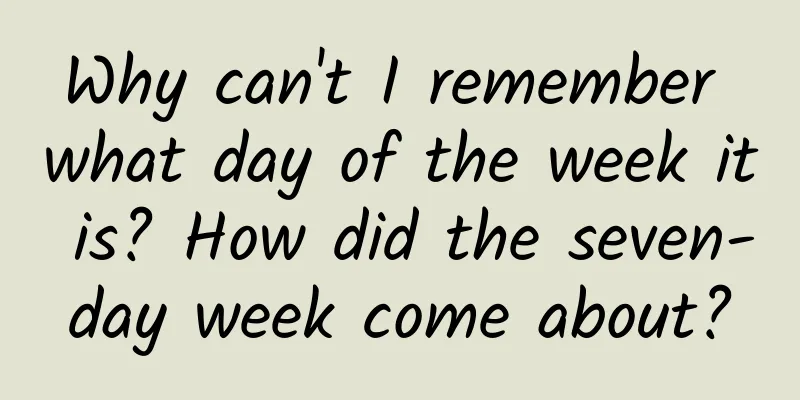Why can't I remember what day of the week it is? How did the seven-day week come about?

|
© Felipe Estay Miller Leviathan Press: The week that we are used to now is actually a relatively recent thing that has entered China. Historically, the Chinese used the lunar calendar, which only has the concept of year, month, and day, but not the week. In the late Qing Dynasty, the Sunday rest system began in some new schools, and was immersed in China's ancient holiday system (one of the earliest practices was the Fuzhou Naval Academy, a school established during the Westernization Movement). But then again, the week is a strange thing. To me, one of the most significant effects of its existence is that it makes us forget what day it is… The time units of "day", "month" and "year" all have their own historical basis, and they (roughly) correspond to the movements of the Earth, Moon and Sun. However, **by comparison, the time unit "week" seems to have an obscure origin. Seven days do not represent any natural cycle, nor can they be considered equal divisions of a month or year. **Although the week has been of great significance to Jews, Christians, and Muslims for centuries, it was not until about 150 years ago that the week or other similar cycles emerged in many parts of the world. Before that, people lived without the "week". Today, the seven-day week is the global norm, and according to UC Berkeley historian David Henkin, the week has become an important beacon in the midst of time. In his new book, The Week: A History of the Unnatural Rhythms That Made Us Who We Are, Henkin fondly calls it “a stubborn calendar unit” and traces its evolution and why it has persisted. © Wikipedia The week as we know it today is a seven-day cycle consisting of workdays and rest days. It originated in ancient Rome and has a history of about 2,000 years. The week in the Roman calendar was a combination of two related usages: the Jewish Sabbath (later the Christian Sabbath) which occurred every sixth day, and the practice of people in the Mediterranean region using the seven celestial bodies (sun, moon, and five other celestial bodies) to mark the days. The week has remained in that form ever since. But Henkin argues that over the past 200 years, as people have become more social and acquainted with more people, the week has taken on new power as a tool for coordinating social and business plans. I recently spoke with Henkin about how the week shapes our view of time and why it has persisted despite all odds. The following is an edited transcript of our conversation. Joe Pinsker: The concept of a seven-day week is very old, but do you think there was an important change in people's perception of the week in the 19th century? What was that change? David Henkin: The week has become more important to people's daily lives, rather than just a matter of whether it's Sunday or not. In some ways, it's become the most stable calendar unit: when you think it's Tuesday and it turns out to be Wednesday, you feel that the days are blurring out, but if you think it's the 26th and it turns out to be the 27th, you don't feel that as much. That's what's changed: the week dominates our perception of time. © Giphy Pinsker: How and why did this happen? Henkin: If I had to name just one reason, I would say urbanization. It's really a social phenomenon: People want to schedule time with other people, especially strangers, to do business or social things. If most people live on farms or in small villages, they don't have to coordinate as many activities with people they don't see very often. So now we have a great need to know what day of the week it is. We plan our recreational activities, violin lessons, guardianship days, or a million other things around the week, and each day has very different activities. Pinsker: How does this change affect our perception of time? Henkin: As a historian, it's hard for me to prove that. But I do think that as we become more attuned to this cycle, time feels like it's going by faster because a week is shorter than a month. Monday feels different from Tuesday and Wednesday, so it's like, all of a sudden, it's Monday again?! You can see in 19th-century diaries that people are increasingly referring to the passing of another week, to describe this feeling of time flying by. © Tenor Pinsker: You write in your book that 100 to 150 years ago, people tried to "reform" the calendar and make the weeks more regular. What was the purpose of this? Henkin: It's about taming the week, making it more reasonable. The week is a very strange unit of time. Among all the units of time, the week is the only one that cannot be used to divide larger units of time, while other units from seconds to centuries can be used. For businesses, this will bring a problem: when a month, a quarter or a year has a different number of weeks, it will lead to irregular accounting. In addition, the reform is also said to solve a broader problem, that is, the statement "Tuesday, November 16, 2021" is strictly redundant, and November 16, 2021 must be a Tuesday. And if people confuse the day of the week with the date, such as scheduling things for Wednesday, November 16 of a certain year, it will cause a lot of confusion, because November 16 of that year may not be a Wednesday at all. Pinsker: So what changes do the reformers want to make? HENKING: They wanted to change the calendar so that November 16th would be a fixed Tuesday. The most popular proposal was to arrange the 364 days of the year into fixed weeks, and then have one or two "blank days" at the end of the year that didn't count as part of any week. Similar reforms were strongly supported by American business interests and the scientific community. This was at a time when the international date line and time zones were being established. The reform movement succeeded in getting governments to adopt Greenwich Mean Time (GMT), but not the weekday system. Pinsker: What led to the failure of this reform? Henkin: The main reason is religion, because Christians, Muslims, and Jews have all used seven days as a week since the beginning of time, and they keep repeating it over and over again. Now suddenly changing the calculation method, no one will be dissatisfied. And I am also a Jew. If I count Saturday or Wednesday differently than others, it will really mess up my life. However, many people also cling to the week for non-religious reasons, even though they know the day of the week has no real meaning. It is not surprising that once people get used to saying Tuesday or Wednesday, they may hesitate to abandon the week system. © Imgur Pinsker: Although the week is not based on any natural cycle, it seems to be a perfect time period for spacing out recurring activities, such as cleaning or calling family members. Do you think the week fits into some kind of natural rhythm in humans? Henkin: I think that's totally reasonable. One hypothesis is what you mentioned, that the week survived because it just happened to fit in perfectly with something. My hesitation about this is that the things that the week fits in perfectly seem to be very contextual, like how often you talk to your mom, the answer was different before the telephone. One neurological explanation is that the seven-day week came about—or more accurately, survived—because people can only remember seven units of information at most. So the seven-day week may just fit in perfectly with people's cognitive abilities. (www.nytimes.com/2019/07/02/magazine/how-to-remember-a-license-plate.html) Another hypothesis is that we have become accustomed to thinking of weeks as a reasonable time interval between events. As a historian, I prefer this hypothesis. Pinsker: In your book, the 24/7 online model of modern life has eroded some of the rhythms that the week represents, because with the Internet, people can decide when to watch TV, shop, or read the news. Do you think the importance of the week is waning? Henkin: When I started writing the book, I thought maybe I was documenting the modern experience of the week, and that it was breaking down. But in the end, I wasn't so sure that the concept of the week was breaking down. I think it's definitely diminished in its power. But on the other hand, writing the book gave me a sense that the week is here to stay. The experience that people had in the early days of the coronavirus pandemic was a great example of this: people felt lost because they didn't know what day of the week it was, and that was a powerful example of how easily time can slip away. By Joe Pinsker Translated by Rachel Proofreading/Yord Original text/www.theatlantic.com/family/archive/2021/11/weeks-seven-days-david-henkin/620712/ This article is based on the Creative Commons License (BY-NC) and is published by Rachel on Leviathan The article only reflects the author's views and does not necessarily represent the position of Leviathan |
<<: What is the charm of dried vegetables? Why are people in the north and south obsessed with them?
>>: The most powerful bird of prey turns out to be a big bald man?
Recommend
Pain points are opportunities: a brief discussion on Didi Chuxing's operating system
“Where there are pain points in the market, there...
One code for all travel across the country, do you need to be quarantined when returning home? The latest situation of 31 provinces, autonomous regions and municipalities is here!
The Spring Festival is coming soon. Are you plann...
A must-read for marketers: 5 senses and abilities you must master!
I have read many marketing books and found that t...
Shangrao Mini Program Production Company, how much does it cost to make a fruit mini program?
In order to better penetrate into various industr...
Why are there more and more popular apps, but their popularity is getting shorter and shorter?
Changba, Moman Camera, Crazy Guess Picture, Face ...
Attention! Your "salt value" cannot be higher! Please check out this little trick to control salt intake →
Food is the first necessity of the people, and ta...
Marketing skills and ideas for Teachers’ Day!
Teachers' Day is coming soon. Have you though...
Be your own tennis star - the first test of the TV version of "All-Star Tennis"
Screen: Sound Effects: operate: Plot: Experience:...
Why did the A4 waist become popular overnight?
Spring is here, everything is reviving, and the g...
Cannon fodder for Project Scorpio? Microsoft Xbox One S unboxing
Three years after the Xbox One was launched, Micr...
With global warming, is it feasible to send polar bears to Antarctica?
Polar bears' survival challenge Polar bears, ...
How to do KOL marketing promotion? 4000 words of dry goods presented
With the rise of short video platforms such as Ti...
Google develops its own SoC, so Pixel is powerful?
Although the Pixel series has performed mediocrel...
How much does it cost to develop a flower mini program in Ya'an?
There are two types of Ya'an Flowers WeChat a...
How to send "space express"? The most complete delivery process! |Young stargazing at the stars and chasing dreams
Young looks at the stars and chases the stars and...









